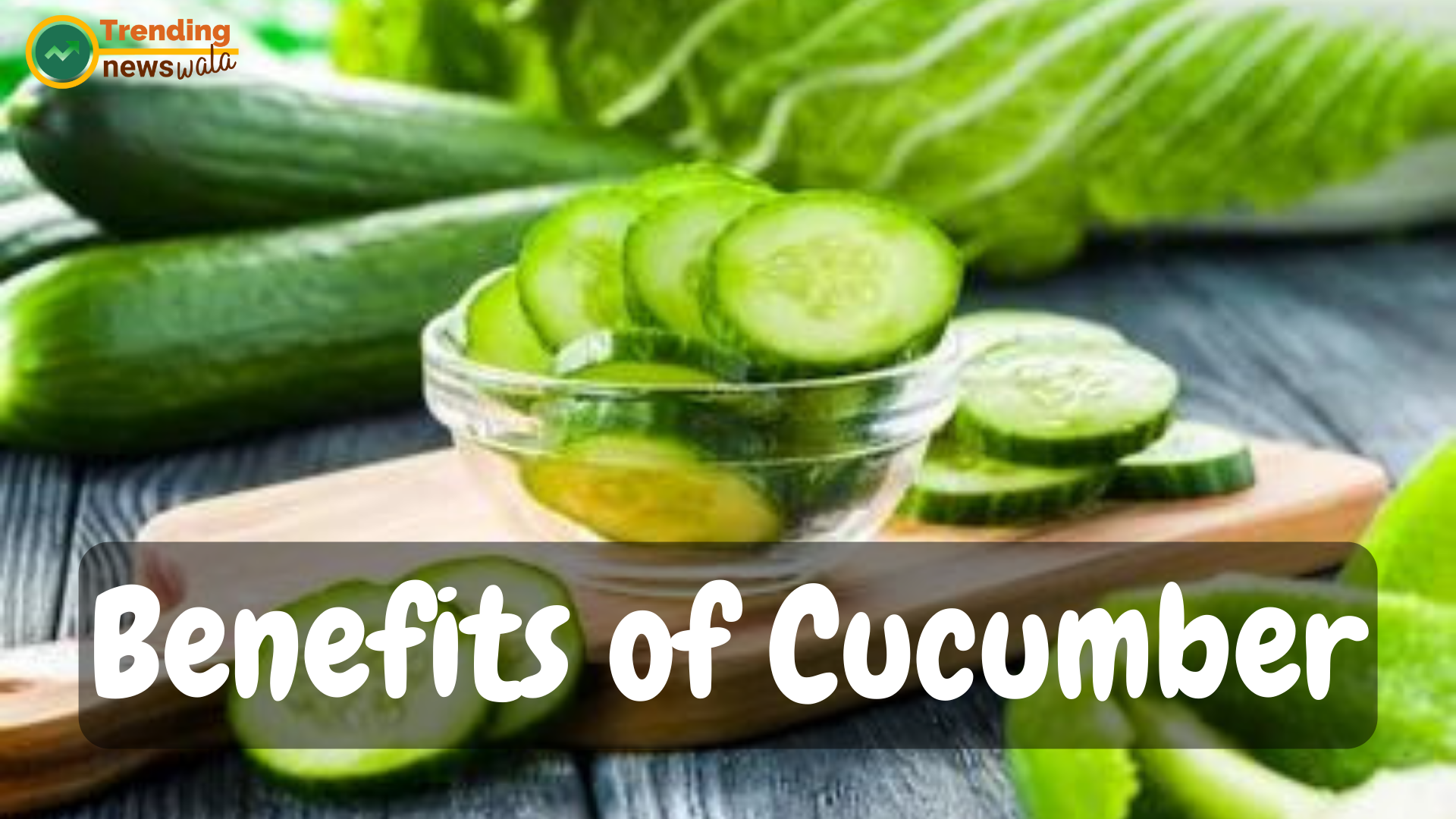10 Benefits of Cucumber

Cucumber is a type of vegetable that belongs to the gourd family, which includes other vegetables like pumpkins, zucchini, and melons. It is typically eaten raw in salads or used as a crunchy topping in sandwiches and burgers.
Cucumbers are usually long and cylindrical, with a dark green skin that is smooth or bumpy, depending on the variety. They have a mild, refreshing taste and a high water content, making them a great choice for staying hydrated.
Cucumbers are also known for their health benefits, as they are low in calories and high in nutrients like vitamin C, vitamin K, and potassium. Some people also use cucumber slices to reduce puffiness and dark circles around the eyes, as they have a cooling and soothing effect on the skin.
Nutritional Facts of Cucumber
Cucumbers are low in calories and a good source of vitamins and minerals. Here are some of the nutritional facts of cucumber per 100 grams:
- Calories: 15
- Carbohydrates: 3.6 grams
- Fiber: 0.5 grams
- Protein: 0.7 grams
- Fat: 0.1 grams
- Vitamin C: 2.8 milligrams (4% of the Daily Value)
- Vitamin K: 16.4 micrograms (21% of the Daily Value)
- Potassium: 147 milligrams (4% of the Daily Value)
- Magnesium: 13 milligrams (3% of the Daily Value)
- Manganese: 0.1 milligrams (5% of the Daily Value)
Cucumbers also contain small amounts of other vitamins and minerals, as well as antioxidants and plant compounds that may have health benefits.
What Are the Benefits of Eating Cucumbers?
Eating cucumbers can provide several health benefits. Here are 10 potential benefits of eating cucumbers:
1. Hydration: Cucumbers are high in water content, which can help keep the body hydrated.
2. Weight management: Cucumbers are low in calories and high in water and fiber, which can help promote feelings of fullness and reduce overall calorie intake.
3. Digestive health: The fiber and water content in cucumbers can help promote regular bowel movements and prevent constipation.
4. Nutrient absorption: Cucumbers contain vitamin C and other nutrients that can help the body absorb other nutrients from food.
5. Skin health: The high water content in cucumbers can help keep the skin hydrated, while vitamin C and other antioxidants can help protect against sun damage and other types of skin damage.
6. Bone health: Cucumbers contain vitamin K, which is important for bone health and may help reduce the risk of osteoporosis.
7. Heart health: Cucumbers contain potassium, which can help lower blood pressure and reduce the risk of heart disease.
8. Anti-inflammatory properties: Cucumbers contain antioxidants and other compounds that may help reduce inflammation in the body.
9. Immune system support: The vitamin C and other antioxidants in cucumbers can help support a healthy immune system.
10. Brain health: Cucumbers contain fisetin, a compound that may have neuroprotective properties and could help promote healthy brain function.
11. Detoxification: Cucumbers contain water and fiber, which can help flush out toxins and waste products from the body.
12. Diabetes management: Cucumbers are low in carbohydrates and high in water and fiber, which can help regulate blood sugar levels and may be beneficial for people with diabetes.
13. Anti-cancer properties: Cucumbers contain phytonutrients called cucurbitacins, which have been shown to have anti-cancer properties in laboratory studies.
14. Eye health: Cucumbers contain vitamin A and other nutrients that are important for eye health and may help reduce the risk of age-related macular degeneration.
15. Dental health: Chewing on cucumbers can help promote the production of saliva, which can help wash away bacteria and food particles and may help prevent tooth decay.
Overall, cucumbers are a nutritious and versatile vegetable that can be enjoyed in a variety of ways, such as in salads, sandwiches, or as a snack with dip.
3 Easy Indian Recipes with Cucumbers
Here are three easy Indian recipes that use cucumbers:
- Cucumber Raita Ingredients:
- 1 large cucumber, peeled and grated
- 1 cup plain yogurt
- 1/4 tsp cumin powder
- 1/4 tsp coriander powder
- Salt, to taste
- Fresh cilantro, chopped
Instructions:
- Mix grated cucumber and yogurt in a bowl.
- Add cumin powder, coriander powder, and salt, and stir well.
- Chill in the refrigerator for at least 30 minutes.
- Garnish with fresh cilantro before serving.
- Cucumber Curry Ingredients:
- 2 large cucumbers, peeled and chopped
- 1/2 onion, chopped
- 2 cloves garlic, minced
- 1 tsp cumin seeds
- 1 tsp coriander powder
- 1/2 tsp turmeric powder
- Salt, to taste
- 2 tbsp vegetable oil
- Fresh cilantro, chopped
Instructions:
- Heat oil in a pan over medium heat.
- Add cumin seeds and fry until they start to pop.
- Add chopped onion and garlic and sauté until they become translucent.
- Add coriander powder, turmeric powder, and salt, and stir well.
- Add chopped cucumber and stir well.
- Cover the pan and cook for 10-15 minutes, stirring occasionally.
- Garnish with fresh cilantro before serving.
- Cucumber Salad Ingredients:
- 1 large cucumber, peeled and sliced
- 1/2 red onion, sliced
- 1 green chili, sliced
- Juice of 1 lemon
- Salt, to taste
- Fresh cilantro, chopped
Instructions:
- Combine cucumber, red onion, and green chili in a bowl.
- Add lemon juice and salt, and stir well.
- Chill in the refrigerator for at least 30 minutes.
- Garnish with fresh cilantro before serving.
Side Effects Of Cucumber
In general, cucumbers are a safe and healthy food to consume. However, some people may experience side effects from consuming cucumbers. Here are a few potential side effects to be aware of:
- Allergic reactions: Some people may be allergic to cucumbers, which can cause symptoms such as itching, swelling, and difficulty breathing.
- Digestive discomfort: Cucumbers are high in fiber, which can be difficult for some people to digest. Consuming too much cucumber can lead to bloating, gas, and diarrhea.
- Pesticide exposure: Non-organic cucumbers may contain traces of pesticides or other chemicals, which can be harmful to health over time.
- Blood sugar issues: Cucumbers have a low glycemic index, meaning they are unlikely to cause spikes in blood sugar. However, people with diabetes or insulin resistance should still monitor their intake of cucumbers to avoid any potential issues.
If you experience any adverse symptoms after consuming cucumbers, it is best to consult with a healthcare professional to determine the cause and appropriate treatment.
Q: What are the benefits of consuming cucumbers?
A: Cucumbers are low in calories and high in water content, making them an excellent food for weight management. They also contain antioxidants, vitamins, and minerals that can support overall health.
Q: Can cucumbers improve skin health?
A: Yes, cucumbers can improve skin health. They contain vitamin C and caffeic acid, which can help to reduce inflammation and irritation. Cucumbers also have a cooling and soothing effect on the skin, making them a popular ingredient in skincare products.
Q: How can cucumbers support digestion?
A: Cucumbers are a good source of fiber, which is important for digestive health. They can also help to regulate bowel movements and prevent constipation. Additionally, cucumbers contain enzymes that can help to break down food and improve nutrient absorption.
Q: Are there any benefits of cucumbers for hydration?
A: Yes, cucumbers are a hydrating food. They are composed mostly of water and can help to replenish fluids in the body. Eating cucumbers can be especially beneficial during hot weather or after exercise.
Q: Can cucumbers help to reduce inflammation?
A: Yes, cucumbers contain anti-inflammatory compounds such as flavonoids and tannins. These compounds can help to reduce inflammation in the body, which is linked to many chronic diseases.
Q: What vitamins and minerals are found in cucumbers?
A: Cucumbers are a good source of vitamin K, vitamin C, magnesium, potassium, and manganese. They also contain smaller amounts of other vitamins and minerals, such as vitamin A and calcium.
Q: Are there any potential risks or side effects of consuming cucumbers?
A: In general, cucumbers are a safe food to consume. However, some people may be allergic to cucumbers or experience digestive discomfort if they consume too much fiber. Additionally, cucumbers may contain trace amounts of pesticides or other contaminants, so it is important to choose organic cucumbers when possible.





